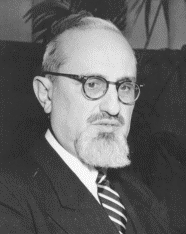Rabbi J.B. Soloveitchik (1903-1993)
Rav J.B. Soloveitchik was born in Pruzana Belorussia and hailed from a great Lithuanian Rabbinic dynasty as the grandson of the Brisker Rav (ztsl), and great-grandson of Rabbi Joseph Baer (ztsl) who served as co--head of the Volozhin Yeshivah. The Brisker method was carried to Palestine by Rabbi Isaac Zeev (1886-1960) the Rav's Uncle, and to America by the Rav's father, Rabbi Moses Soloveitchik (ztsl) who was appointed head of the Talmud faculty at Yeshiva University.
In 1925 Rav J.B. Soloveitchik went to the University of Berlin for 6 years to study philosophy and specializing in logic, metaphysics, and epistemology and later received his doctorate in 1932 on the epistemology and ontology of Hermann Cohen’s neo-Kantian work, Religion of Reason Out of the Sources of Judaism. This influence is seen later in the Rav's joining Drs. Harry Ausen Wolfson and Solomon Zeitlin in a 1935 lecture series celebrating the Maimonides octocentennial where the Rav spoke on "Maimonides and Kant onn the Conception of Freedom of the Will and the Problem of Physical Causality in the Modern Theory of Knowledge" and "Maimonides' Philosophical and Halakhic view of Homo Sapiens and the Modern Philosophy of Value".
In 1932 the Rav served as the rabbi of Boston. In 1941 he succeeded his father as head of the Talmud faculty of the Rabbi Isaac Elchanan Theological Seminary and also taught Jewish philosophy at at Yeshivah University’s graduate school of Jewish studies. In the 1950s became the president of the Religious Council of Zionists of America and chariman for the halakha commission of the Rabbincial Council of America. He sought to show how the ish ha-halakhah combines the cognitive drive of scientific method with the religious pathos and yearning for divine holiness of homo religiiousus. The Rav always affirmed the importance of secular studies especially science and was an eloquent spokesman for modern Zionism as formulated in Kol Dodi Dofek. The Rav offered brilliant explications of the theology implicit in halakhah and was a midrashist of incomparable skill and gift.
The Rav expressed himself and wrote in Hebrew, English, and Yiddish. Halakhic Man first appeared in Talpiot (1944) in Hebrew and Lonely Man of Faith was first published in Tradition (Summer 1965), pages 5-67, while "But If You Searth There" first appeared in Hadorom 47 (1978), pages 1-85 in Hebrew. The spring 1978 issue of Tradition carried 5 essays (see also David Telsner ed. Five Sermons (Jerusalem, Tal Orot, 1974). As more writings come to light and the Rav's casette tapes are published in print form the list of the Rav's publications has grown, and today there are over 25 post-humous printed works. Today there are three volumes available which present reconstructions of a large number of the Rav's public lectures (see Joseph Epstein, ed. Shiurei Harav (NY: Hamevaser, 1974); Pinchas Peli, ed. On Repentance (Jerusalem: WZO, 1974), etc.
As with Rabbi Hayyim of Volozhin in the early 19th century Rav J.B. Soloveitchik devoted himself to helping us understand the role of Talmud torah lishma, within the overall context of Judaic life and faith. The Rav harnassed his extensive exposure and knowledge of secular Western learning so as to advance Judaism's religous ends.
David B Levy
TheRav.net A comprehensive guide to his works

Stay connected!
Like us on FacebookLike us on Facebook Follow us on TwitterFollow us on Twitter View our InstagramView our Instagram Read our BlogRead our Blog Watch our VideosWatch our Videos